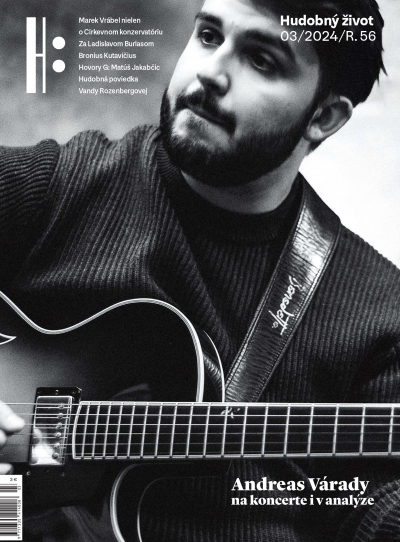

-
Autor:
rôzni
-
Category:
-
ISBN:
13 35-41 40
-
Published:
2024
-
Number of pages:
40
-
Price incl. VAT:
€2,50
-
Price without VAT:
€2.38
- Free delivery in Slovakia by Slovak Post!
-
Stock status:
In stock
- Order a subscription
- Buy a digital version
Music Life 2024/3
- Marek Vrábel, organist and director of the Church Conservatory, on the crisis of professional music education
- We caught guitarist Andreas Várady during a concert in Bratislava and also bring an analysis of his composition
- We remember the late Prof. Ladislav Burlas, musicologist, educator, and composer
- Bard of Lithuanian music of the 20th century, Bronius Kutavičius, in an analysis of his work "Last Pagan Rites"
- Jazz Talks with Matúš Jakabčic
- Reviews of concerts, opera performances, and CDs
How many specialized schools are too few and how many are too many? This question has become burning, one that we've been asking ourselves in the world of music for quite some time now. Provoked by encounters with managers of professional orchestras who cannot help but marvel at the level of applicants for job positions during auditions. Until the beginning of the 90s, Slovakia had only three conservatories for decades, which were fiercely contested among talented youth, and admission to the only university-level music school in the country was reserved for the elite with professional stage ambitions. Today, fourteen conservatories offer specialized music education, yet this system fails to produce quality musical material even for orchestras in the regions. And the problem of the level of conservatories logically spills over into universities...
Where did the mistake happen? Why, at a time when interest among talented children (and their parents) in artistic fields is declining, is the number of schools fishing in these waters increasing? Is it enough if conservatories are merely breeding grounds for more and more teachers for basic art schools? Which, let's be honest, in poorer regions are places of work and financial stability, subsequently sending the youth back into the system of the 14 conservatories... It's a public secret that talented students are rather exceptions in this peculiar system, that those who can afford it opt for foreign schools for conservatory education, not to mention universities. Writing about the problem is, understandably, poking the hornet's nest because the 14 conservatories have already generated many job positions. Our music education has long lost the mark of selectivity, exclusivity, and elitism and has embarked on a path of pretense. When this "pyramid" will collapse, no one knows, and it's hard to understand why the state supports it.
That's why we highly appreciate that the director of one of the conservatories, organist Marek Vrábel, spoke out on this topic. His words not only hit home but also offer solutions. At the same time, the interview with him opens the doors to the backstage of the only church conservatory in our country.
We were saddened by the passing of Professor Ladislav Burlas, who left a unique, over 70-year-long mark on the Slovak music scene through his active work in musicology, pedagogy, and quality compositional creation. Honour to his memory.
In our context, we have a unique opportunity to get acquainted with the work of the bard of Lithuanian music of the 20th century, Bronius Kutavičius, through a text by composer Adrián Demoč about the composition "Posledné pohanské obrady" (The Last Pagan Rites).
We're excited about the pair of texts on the exceptional Slovak jazz guitarist Andreas Váradym, whom we introduce through a reflection on his recent concert in Bratislava and an analysis of his composition. The jazz section continues with an interesting series on jazz guitar, where active players present different stages of its development.
We remind you that our texts are also available in the online version of Hudobný život (Musical Life) at hudobnyzivot.sk. Still free of charge.
